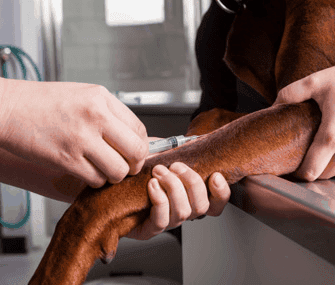What does it mean when a veterinarian says she needs to run some blood work on your pet? Blood work – presurgical or otherwise – is usually a combination of a complete blood count (CBC) and a blood chemical analysis. Blood work ranges from a basic to sometimes very specific evaluation tool. Pets, particularly senior ones, should have annual labwork to evaluate your pet’s overall health and try and catch issues before they become a full-blown health crisis.
When the blood sample is drawn from your pet, both the cells and the fluid they “travel” in (serum) are examined. The cell part of the blood is examined in the complete blood count or CBC. The CBC determines the number of red blood cells, the number and type of white blood cells, the number of platelets. It also tells you whether or not your pet is anemic.
A chemistry panel (blood chem, chemistry screen) mixed with some specialized tests evaluates kidney function, liver function, electrolyte levels, etc. It is also used to detect specific diseases such as diabetes, hyper- and hypothyroidism, pancreatitis. Hyperandrenocorticism and more.
The chemistry panel usually includes the following tests: alkaline phosphatase (SAP, ALP), alanine transaminase (alanine aminotransferase, ALT), bilirubin total (T Bili), blood urea nitrogen (BUN), creatinine, creatine kinase (CK, CPK), sodium, potassium, glucose, total protein, albumin, etc. Alkaline phosphatase, alanine transaminase, bilirubin, and albumin give your veterinarian information about the pet’s liver function. Blood urea nitrogen, creatinine, and creatine kinase tell your veterinarian how well your pet’s kidneys are functioning.
Veterinarian in Houston Heights
Urban Animal Veterinary Hospital
1327 Yale St
Houston, TX 77008
(713) 863-0088



